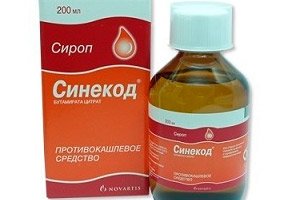
All iLive content is medically reviewed or fact checked to ensure as much factual accuracy as possible.
We have strict sourcing guidelines and only link to reputable media sites, academic research institutions and, whenever possible, medically peer reviewed studies. Note that the numbers in parentheses ([1], [2], etc.) are clickable links to these studies.
If you feel that any of our content is inaccurate, out-of-date, or otherwise questionable, please select it and press Ctrl + Enter.
Syrup Synekod for coughs for children
Medical expert of the article
Last reviewed: 04.07.2025

It is a centrally acting antitussive drug (belongs to such a group of pharmaceutical drugs). It is produced in the form of drops for oral administration. The main active ingredient is butamirate citrate in a concentration of 5 mg/ml. The international non-proprietary name is butamirate.
ATC classification
Active ingredients
Pharmacological group
Pharmachologic effect
Indications Synecod syrup
Prescribed for dry cough of any origin. Also prescribed to suppress cough in the preoperative and postoperative period during various surgical interventions in the bronchial area, as well as during bronchodilation.
For more information about cough syrups for children, read this article.
Release form
It is a liquid, the shade of which varies from colorless to slightly yellow. The liquid has a vanilla smell.
Pharmacodynamics
The active substance has a powerful expectorant effect, the effect of which is bronchodilating and anti-inflammatory. Also, the mechanism of action is to affect the cough center, as a result of which spirometry indicators are significantly improved. Intensive oxygenation of the blood also occurs.
The active substance has the ability to bind when taken orally. The maximum concentration of the drug in the blood is detected after 1.5 hours. The half-life is approximately 6 hours. If the drug is prescribed repeatedly, cumulation is not observed, the accumulation of the drug in the blood is linear. Hydrolysis of the drug begins in the blood. Metabolites have antitussive activity. Metabolites are excreted mainly in the urine. Metabolites are associated with glucuronic acid.
Dosing and administration
Apply before meals. Children under one year are prescribed 10 drops, children from one to three years are prescribed 15 drops, and children over three years are prescribed 25 drops. The frequency of administration is 3-4 times a day. Side effects are observed in the form of skin reactions, rashes and skin irritation. Nausea, vomiting, dizziness, diarrhea, and various allergic reactions are also observed.
Contraindications
This cough syrup is contraindicated for children with hypersensitivity to individual components of the drug, as well as allergic reactions. Not recommended for children under 2 months.
Side effects Synecod syrup
Side effects are rare, but if present they manifest as skin rashes, nausea, and vomiting.
 [ 3 ]
[ 3 ]
Overdose
Overdose causes symptoms such as drowsiness, nausea, and vomiting. Also, a person often experiences impaired coordination of movements, decreased blood pressure, loss of consciousness, and imbalance. Treatment is aimed at removing the toxin from the body and neutralizing it. Activated carbon is used for therapeutic purposes, which binds and removes toxic substances from the body. After neutralizing the poison, supportive and restorative treatment is used, aimed at normalizing and maintaining the normal functional state of the body.
Attention!
To simplify the perception of information, this instruction for use of the drug "Syrup Synekod for coughs for children" translated and presented in a special form on the basis of the official instructions for medical use of the drug. Before use read the annotation that came directly to medicines.
Description provided for informational purposes and is not a guide to self-healing. The need for this drug, the purpose of the treatment regimen, methods and dose of the drug is determined solely by the attending physician. Self-medication is dangerous for your health.

